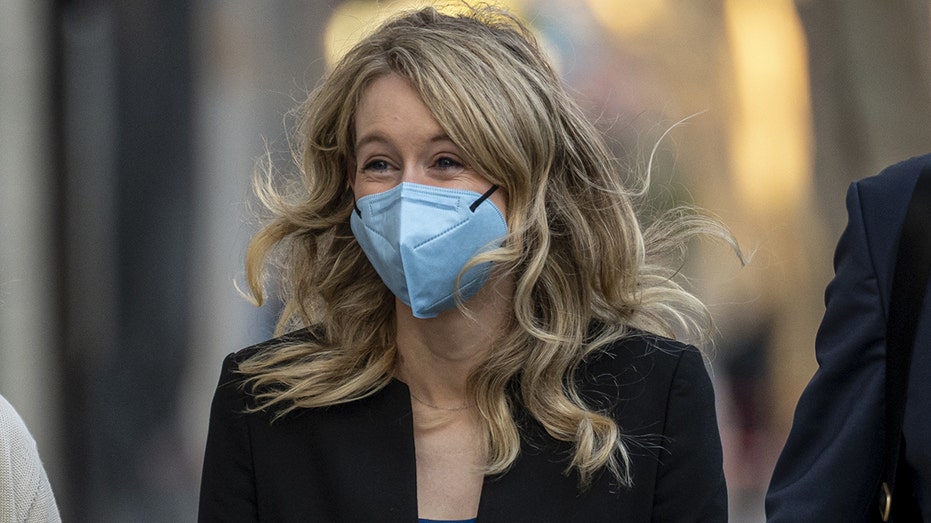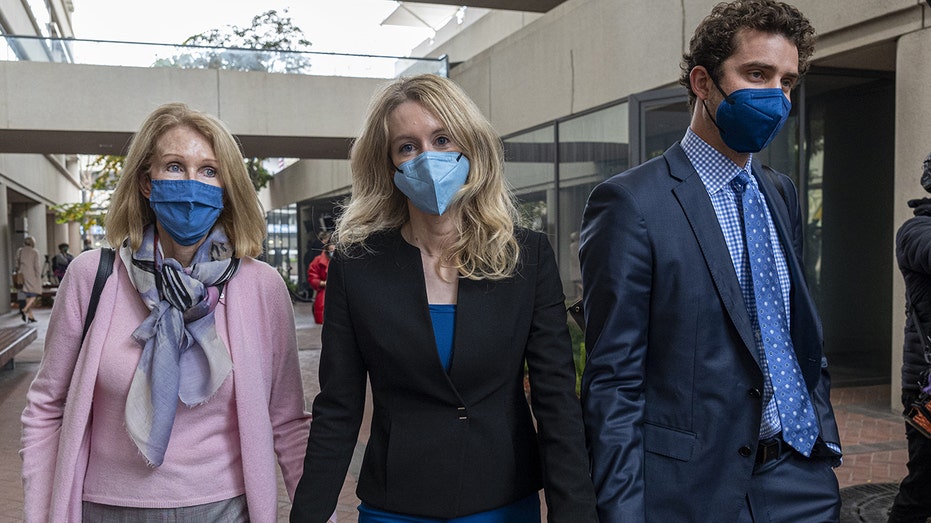The Elizabeth Holmes trial: Defense maintains Theranos founder didn’t mislead anyone
An attorney for Elizabeth Holmes told jurors that there could be an explanation for inflated revenue projections
Elizabeth Holmes putting on 'very believable act': Lashinsky
FOX contributor Adam Lashinsky comments on the unravelling of the Theranos trial.
An attorney for Elizabeth Holmes had his final opportunity Friday to distance the Theranos Inc. founder from the criminal-fraud allegations she faces, telling the jury that an accounting error could explain allegations that she inflated revenue projections, and her statements about working with the military were aspirational.
In his closing arguments, defense lawyer Kevin Downey tried to rebut some of the prosecution’s main evidence point by point, urging jurors to acquit Ms. Holmes on nine wire fraud and two conspiracy charges claiming she misled the blood-testing startup’s patients and investors.
"She believed she was building a technology that would change the world. That’s our story," Mr. Downey told the jury of eight men and four women as they prepare to deliberate at the conclusion of the more than three-month-long criminal trial.
Mr. Downey wrapped up his pitch to the jury before a government prosecutor offered a rebuttal, arguing that Theranos was plagued by "a lack of honesty" that came from its leadership.
Ms. Holmes founded Theranos after dropping out of Stanford University during her sophomore year. She built it up over nearly a dozen years before a series of Wall Street Journal articles beginning in 2015 revealed problems with the company’s vaunted finger-stick blood-testing technology, precipitating regulatory action, criminal charges and Theranos’s eventual collapse in 2018.
THE ELIZABETH HOLMES TRIAL: THERANOS FOUNDER ADMITS REGRETS, DEFLECTS PROSECUTORS
Mr. Downey argued that lofty financial projections Theranos gave to investors were grounded in reality. Projections for revenue of about $140 million in 2014 and about $990 million in 2015 accounted for deferred revenue that, had it materialized, would have made those projections accurate, he said. He said he didn’t know why the company thought it could count deferred revenue as actual revenue.
"Investors understood projections were uncertain," Mr. Downey said.
He also insisted that Ms. Holmes was never told that there were widespread accuracy or reliability problems with Theranos’s tests, as the government alleges, and that a handful of anecdotes presented at trial don’t come close to proving the point.
Ms. Holmes’s lawyer left unaddressed the abuse allegations she lodged against Ramesh "Sunny" Balwani, her former boyfriend and top deputy at Theranos. From the stand, Ms. Holmes said Mr. Balwani was emotionally and sexually abusive, claims his lawyer has strongly denied.

Elizabeth Holmes, founder of Theranos Inc., arrives at federal court in San Jose, California, U.S. Photographer: David Paul Morris/Bloomberg via Getty Images (Photographer: David Paul Morris/Bloomberg via Getty Images / Getty Images)
Mr. Downey didn’t attempt to tie the allegations to the case or tell jurors how to contextualize the claims. The government told jurors in its own closing arguments whether they believe the claims of abuse aren’t relevant to their decision to find Ms. Holmes guilty or not guilty.
When U.S. District Judge Edward Davila issued an order last year to separate Ms. Holmes’s and Mr. Balwani’s trials, he wrote that Ms. Holmes would "eventually have to connect the alleged abuse to the charged conduct for the abuse to be relevant and admissible."
Prosecutors said last week they would ask Judge Davila to strike some of the testimony, because defense lawyers never appeared to have met the legal bar to introduce the abuse defense. But they never followed through on the request.
Steering clear of the abuse allegations, Mr. Downey focused on Ms. Holmes’s interactions with the investors and patients named in the indictment.
"People lost money. I don’t mince words about that," Mr. Downey told jurors. That potential outcome, however, was known to investors from the start, he said, showing jurors a stock-purchase agreement investors signed saying it was speculative in nature.

Elizabeth Holmes, founder of Theranos Inc., center, leaves federal court in San Jose, California, U.S., on Wednesday, Dec. 8, 2021. Photographer: David Paul Morris/Bloomberg via Getty Images (Photographer: David Paul Morris/Bloomberg via Getty Images / Getty Images)
Mr. Downey told jurors that Ms. Holmes hadn’t misled investors about work Theranos was doing with the U.S. military. Revisiting a call Ms. Holmes held for investors in 2013, Mr. Downey went sentence by sentence to argue that Ms. Holmes was talking about the potential application of Theranos’s technology in military helicopters or to save soldiers' lives, not something that was already happening.
"She did not say these devices are in flight for clinical use," he said. "She’s saying there’s a potential application in the future with the military."
Contracting records show Theranos’s work with the military was limited in its scope. In total, Theranos appeared to have received less than $9,000 from its military contracts, according to the procurement records. In one case, military officials briefly explored a relationship with Theranos before rejecting the company’s regulatory strategy, the Journal has reported.
THERANOS TOOK SHORTCUTS AS BLOOD-TESTING TECHNOLOGY FAILED, PROSECUTORS SAY
Theranos’s investors, Mr. Downey argued, bore some responsibility for their financial losses, saying some of the company’s backers failed to ask questions or educate themselves with publicly known information.
Alan Eisenman, an investor from Texas who sank about $1.2 million into Theranos, testified that he was cheated and lied to by Ms. Holmes. Mr. Downey countered that many of the things that Mr. Eisenman said had been hidden from him were publicly known, including that Theranos performed the traditional needle-in-the arm blood draws as part of its testing services.

Elizabeth Holmes, center, leaves federal court in San Jose, Calif., Monday, Nov. 22, 2021. (AP Photo/Nic Coury) (AP Newsroom)
Investors who asked questions, such as government witness Chris Lucas, received accurate information from Ms. Holmes, Mr. Downey said.
Mr. Lucas’s testimony didn’t support that assertion. He testified that there was such a disconcerting information deficit from Ms. Holmes that he cautioned his colleagues at Black Diamond Ventures. They made the investment anyway.
Mr. Downey argued that the government failed to prove the wire fraud counts related to patients, saying the three patients who testified were among some 8 million test results Theranos produced in its history. He faulted the government for not providing any broader statistical evidence—a hotly contested issue ahead of trial because of a Theranos database rendered inaccessible that each side blamed the other for making unusable.
READ MORE ON FOX BUSINESS BY CLICKING HERE
Mr. Downey concluded by returning to comments he made in his opening statements: that Ms. Holmes couldn't have intended to defraud anyone because she never sold a single share in the company, of which she owned about half.
"She believed in this technology," Mr. Downey said. "She stayed the whole time. And she went down with that ship when it went down."




















